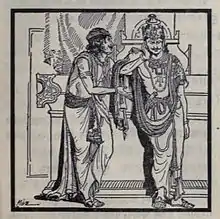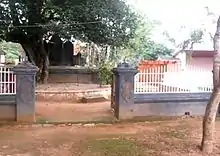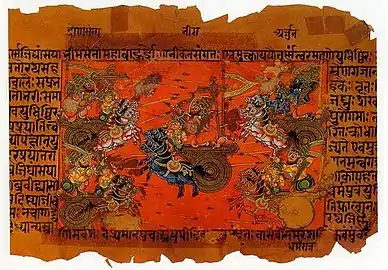Shakuni
Shakuni (Sanskrit: शकुनि, lit. bird) also known as Saubala (Sanskrit: सौबल, lit. son of Subala), Gandharnaresh, Gandhararaja (Sanskrit: गान्धारराज, lit. king of Gandhara) and Subalraja (Sanskrit): सुबलराज, lit. "King of the Kingdom of Subala" was the prince of the Gandhara Kingdom, later to become the King after his father's death. He is the main antagonist in the Hindu epic Mahabharata. He was the brother of Gandhari and hence Duryodhana's maternal uncle.[1]
| Shakuni | |
|---|---|
| Mahabharata character | |
 Shakuni and Duryodhana | |
| In-universe information | |
| Weapon | Sword, Gada and Bow and Arrow |
| Family | Subala & Sudarma (parents) Gandhari (sister) |
| Spouse | Arshi |
| Children | Uluka, Vrikaasur, Patatri and Vriprachitti |
| Relatives | Dhritarashtra (brother-in-law) Duryodhana, Dussasana, Vikarna, Duhsala and 97 others (nephew-niece) |
| Part of a series on |
| Hinduism |
|---|
 |
|
Clever and shrewd, Shakuni's hatred developed when his sister was married to blind Dhritarashtra. Shakuni influenced his eldest nephew, Duryodhana from his childhood and plotted against the Pandavas multiple times. Later in the epic, Shakuni planned the game of dice, which was one of the turning points. During the Kurukshetra War, Shakuni was killed by Pandava Sahadeva.
Family and Skills
Shakuni was born in Gandhara to its king, Subala. He had a sister named Gandhari, who was dear to Shakuni. Portrayed as an extremely intelligent, crafty and devious man, Shakuni is often credited as the mastermind behind the Kurukshetra War. Shakuni was one of the greatest illusionists. Shakuni married Arshi and had three sons named Uluka, Vrikaasur and Vriprachitti. The original texts of Mahabharata mention Shakuni as personification of Dvapara Yuga.[2][3]
Hatred towards Hastinapura
In the Mahabharata, Shakuni's hatred towards Hastinapura developed when Bhishma approached King Subala with a marriage proposal for Shakuni's sister Gandhari's, to the blind Kaurava prince Dhritarashtra. Shakuni hated the idea of Gandhari's marriage with the blind prince of Hastinapura. Gandhari covered her eyes on her will to share her blindness. Shakuni's anger grew when Dhritarashtra was first denied to inherit the throne of Hastinapura. After the event, Shakuni started to interfere in the matters of Hastinapura.[4][5]
Other Versions
- A version, originating from Jain texts, is very popular but this is never mentioned in the Mahabharata.[6] As per the story, Gandhari, being a Mangalik, was married to a tree (some say a goat) prior to her marriage to Dhritarashtra, in order to nullify the defect. On hearing of this, a disgusted Dhritarashtra ordered the extermination of Gandhara's royal line. Shakuni, his father, Subala and Subala's other hundred sons were captured and put in prison. One grain was served to every person. Knowing that Shakuni was the smartest, Subala and his 99 sons sacrificed their lives and provided their share of grain to Shakuni. Later, they all died and Shakuni vowed to destroy Hastinapura.[7][8][9] However, in Mahabharata, Shakuni's brother fought in the Kurukshetra War, proving this to be a popular myth.[10]
- According to a Jain tradition, that contradicts the Mahabharata, while Shakuni was still a young boy, Gandhara was invaded by a Kuru prince, with (different versions of the story naming the attacker as Pratipa, Shantanu, Devavrata, or Vichitravirya). Shakuni, his father, his brothers, his uncles, and his cousins were imprisoned, with Hastinapur arguing it was to restore dharma to Gandhara, but Shakuni claiming that it was a pure power-grab. When the Gandhara royal family argued that food must be given to prisoners, only one grain of rice is given to each captive. Knowing that Shakuni is the wisest among them (and in some versions the youngest) and most able to take revenge, the prisoners give all their food to Shakuni so that he can survive. Eventually, all of Shakuni's imprisoned family members die. His uncle (or father) begs for mercy and bends the knee to Hastinapur, freeing Shakuni who vows his revenge. Shakuni received a boon from his father that he will be a great politician and will defeat other people with his political genius.
In whatever the case, Shakuni swears to avenge this by slowly destroying Hastinapur. He achieves this by poisoning the mind of his volatile nephew Duryodhana into instigating the war with the Pandavas, which destroyed the Kuru line. Thus, he is seen by many as one of the key persons that caused the Kurukshetra War. He was the mastermind in corrupting the relation between the sons of Gandhari and Kunti which led to the great war. Some versions of the story describe Shakuni using the bones of his dead parents/family members to create dice that will never lose him a game, as Shakuni's father's soul enters the dice to make it roll to whatever number Shakuni wanted.[11]
Plots and Influence in the Mahabharata
Shakuni is also one of the masterminds behind the Kurukshetra War. His intentions include his desire to avenge the insult Bhishma made. Shakuni's main enmity was with Bhishma, who had brought the proposal of his beloved sister, Gandhari, which Shakuni thought was an insult to Gandhara. Shakuni also stabbed in his own leg and vowed that he will destroy The Kuru Kingdom and later he changed his vow and vowed to make Duryodhana the emperor of Kuru Kingdom but his this oath (or vow) never succeeded.[12]
He mainly worked by inciting hatred between the Kauravas and Pandavas; his plans culminated in the largest war in history. Although he often failed in his tricks against the Pandavas, he never lost faith in his ability to destroy the lineage of Kuru. A far-sighted man, his plan was much bigger than causing plight to the Pandavas; he wanted a full-scale civil war between the branches of the Kuru clan, which would destroy the whole clan, fulfilling his revenge. He feared nobody, except Krishna, whom he considered as an obstacle since he knew that only Krishna had the power and influence to foil his plan. Krishna was a shrewd diplomat and statesman, the only person who matched Shakuni's cunning and intelligence. Shakuni wanted a war between the branches of the Kuru kingdom since the marriage of Gandhari with Dhritarashtra and Krishna also wanted the war when Draupadi was insulted and when the peace talks of himself were rejected by Duryodhana. Shakuni wanted the war to avenge his sister's humiliation and Krishna wanted the war would happen to show that righteousness will always triumph over unrighteousness.
Ways in which Shakuni incited war include:
- Advising an adolescent Duryodhana to mix poison into Bhima's food twice.[13]
- Hiring Purochana to kill the Pandavas in the House of Wax.[14]
- Arranging the game of dice between Kauravas and Pandavas which was responsible for Draupadi's humiliation.[15]
- Before the war, he advised Duryodhana to feed Shalya's army and put Shalya in his debt, making it compulsory for him to fight on the side of Kauravas.[16]
Shakuni's only saving grace is his extreme love for his sister Gandhari. Gandhari was petrified of the dark when she was small and preferred to have well-lit places all the time. Being a dutiful wife, she voluntarily blindfolded herself which meant she had to live every second of her life in absolute terror because of the darkness due to blindfold. This does not go down too well with Shakuni, who constantly advises her to take off her blindfold. Time and again, he expresses the anger he felt for the injustice that Gandhari had to go through by leading her entire life with a blindfold.[17]
The Game of Dice

Shakuni was an expert of Dice Game and he had dice made out of his father's bones which he could control on his will.[18] Shakuni organized a Dice Game, as he knew that Yudhishthira's biggest weakness is his love of playing it. Rules were set and later using his skills and controlled dice, Duryodhana won Yudhishthira's Kingdom, his brothers- Bhima, Arjuna, Nakula, Sahadeva and even Yudhishthira himself. Later, he won Draupadi too.[19] Dussasana on Duryodhana's orders tried to disrobe Draupadi but Krishna saved her. This game was of Shakuni is a very important event in the Mahabharata which led to the Kurukshetra war between Kauravas and Pandavas.[20][21]
Role in the War
On the 18th day before the war, Duryodhana convinced Shakuni to be the Commander-in-Chief of his army but he preferred Shalya. Shakuni participated in the Kurukshetra War and defeated many warriors.[22]
On the very first day of the war, Shakuni, Duryodhana and Dushasana attacked Yudhishthira to kill him but they failed. On the 2nd day, he got defeated by Sahadeva in a Sword Duel and by Satyaki in Archery. On the 4th day, he killed 5 powerful Generals of Magadha. On the 5th day of the war, he got defeated by Arjuna in Archery battle and by Dhrishtadyumna in Sword Duel. On the 7th day, he got defeated by Bhima in Gada-Yuddha and by Drupada in Archery.
On the 9th day of the war, he got defeated by Yudhishthira in a Spear Combat and by Abhimanyu in Archery. On the 10th day of the war, he stopped Shikhandi from reaching Bhishma. He also defeated Shikhandi in a battle of Axe-Fighting on the same day. Shakuni also stabbed him in his stomach. On the 12th day, he slew king Sahadeva of Magadha. Later, he defeated Upapandavas and Virata. He also fought with Dhrishtadyumna two times, firstly he defeated him and secondly he got defeated.
On the 13th day, Shakuni and other Maharathis attacked and killed Abhimanyu. Many of them backstabbed Abhimanyu.[23] On 14th day, he fought with Nakula to save Jayadratha but got defeated. After Jayadratha's death, he planned a Night War. In the night war he defeated Drupada, Virata and Satyaki. On the 17th day his son, Vrikaasur was slained by Nakula.
Death
After the Game of Dice episode in the Mahabharata, the youngest of the Pandava brothers Sahadeva had taken an oath to avenge Draupadi's insult and had sworn to kill Shakuni, the mastermind of the episode.[24]
On the 18th day of the Mahabharata war, Pandavas attacked Shakuni, Uluka and their army. As Duryodhana and his other brothers rushed to protect their uncle, Bhima stepped in and fought the remaining Kauravas and killing many of them (except Duryodhana). Meanwhile, Nakula killed many prominent Gandharan warriors and the bodyguards of Uluka. Sahadeva fought Shakuni and Uluka and, not long afterwards, killed Uluka. Shakuni became furious and attacked Sahadeva. He broke his chariot and bow, Sahadeva ascended another chariot and fought Shakuni ferociously. After many attacks and tackles, both of them descended their chariots to settle things in a duel. Sahadeva was then able to smash an axe into Shakuni's forehead, fulfilling his oath.[25][26]
Legacy

The one and only temple in the world dedicated to Shakuni is situated at a small village called Pavithreswaram of Kottarakkara Taluk of Kollam District in Kerala State of India as Malanada Maladeva (Shakuni) Temple. Here a granite stone under a huge tree called Kanjira (Strychnos nux vomica) is worshipped as the seat of him. Here he is being in a position of meditating Lord Shiva, one of the Trimurtis of Hinduism.
In Popular Culture
- In Bhagwati Prasad Mishra's Hindi film Draupadi (1931), Hadi portrayed Shakuni Mama
- In BR Copra's classic series Mahabharat (1988) and Mahabharat Katha, Gufi Paintal portrayed Shakuni.[27]
- In Peter Brook's Mahabharat (1989), Tuncel Kurtiz portrayed Shakuni.
- In Ramanand Sagar's series Krishna, J. P. Sharma portrayed Shakuni.
- In the series Draupadi (2001), Ravi Jhankal portrayed Shakuni
- In Ek Aur Mahabharat, Prakash Dwivedi played Shakuni
- In Ekta Kapoor's series Kahaani Hamaaray Mahaabhaarat Ki, Kali Prasad Mukherjee played Shakuni
- Vinay Apte's character Babulal in Prakash Jha's Rajneeti was loosely inspired by Shakuni
- Praneet Bhat portrayed Shakuni in Star Plus's successful series Mahabharat (2013)[28]
- In the animated movie Mahabharat (2013), Anupam Kher voiced Shakuni
- In Suryaputra Karna, Ajay Jayram played Shakuni
- Ajay Kumar Nain played Shakuni in Karna Sangini
- Sai Ballal portrayed Shakuni in Star Bharat's popular series RadhaKrishn
References
- Shroff, Aarsh (12 December 2019). "Shakuni: The Master Conspirator". Glorious Hinduism. Retrieved 1 September 2020.
- Shroff, Aarsh (12 December 2019). "Shakuni: The Master Conspirator". Glorious Hinduism. Retrieved 1 September 2020.
- Mani, Vettam (1975). Puranic encyclopaedia : a comprehensive dictionary with special reference to the epic and Puranic literature. Robarts - University of Toronto. Delhi : Motilal Banarsidass.
- "The Mahabharata, Book 1: Adi Parva: Sambhava Parva: Section CX". www.sacred-texts.com. Retrieved 1 September 2020.
- Srivastava, Diwaker Ikshit (11 December 2017). Decoding the Metaphor Mahabharata. One Point Six Technology Pvt Ltd. ISBN 978-93-5201-000-4.
- Pattanaik, Devdutt (2010). Jaya: An Illustrated Retelling of the Mahabharata. Penguin Books India. p. 141. ISBN 978-0-14-310425-4.
- Pattanaik, Devdutt (2010). Jaya: An Illustrated Retelling of the Mahabharata. Penguin Books India. ISBN 978-0-14-310425-4.
- "Why Gandhari's father got her first marriage with a goat! Click here to know | NewsCrab". www.newscrab.com. Retrieved 1 September 2020.
- Ritu (17 October 2013). "Shakuni – the real story". Indian Mythology. Retrieved 1 September 2020.
- Suri, Chander Kanta (1992). Shakuni. Books For All.
- https://detechter.com/8-interesting-facts-about-shakuni-of-mahabharata/
- Viswanathan, Priya (16 January 2015). "Shakuni - A Villian or a Victim of Circumstance?". Dolls of India. Retrieved 1 September 2020.
- Menon, [translated by] Ramesh (2006). The Mahabharata : a modern rendering. New York: iUniverse, Inc. p. 103. ISBN 9780595401871.
- www.wisdomlib.org (9 January 2015). "The House of Lac at Varanavata [Chapter 12]". www.wisdomlib.org. Retrieved 1 September 2020.
- Chatterjee, Mallar. Shakuni & The Dice of Doom. Readomania.
- Shalya giving a boon to Yudhisthira http://sacred-texts.com/hin/m06/m06043.htm
- "The Mahabharata, Book 1: Adi Parva: Sambhava Parva: Section CX". www.sacred-texts.com. Retrieved 1 September 2020.
- "Untold story of Mahabharat: मामा शकुनि के अद्भुत पासे का रहस्य, जिससे बाजी जीत कर भी हार गए कौरव". Amar Ujala (in Hindi). Retrieved 1 September 2020.
- "The Mahabharata, Book 2: Sabha Parva: Sisupala-badha Parva: Section LXIV". www.sacred-texts.com. Retrieved 1 September 2020.
- Chatterjee, Mallar. Shakuni & The Dice of Doom. Readomania.
- "Mahabharat Episode 31: The Game of Dice". Isha Sadhguru. 25 March 2019. Retrieved 1 September 2020.
- "18 Days of The Mahabharata War - Summary of the War". VedicFeed. 27 June 2018. Retrieved 1 September 2020.
- "The Mahabharata, Book 7: Drona Parva: Abhimanyu-badha Parva: Section XLVII". www.sacred-texts.com. Retrieved 26 July 2020.
- "The Mahabharata, Book 5: Udyoga Parva: Sanat-Sujata Parva: Section L". www.sacred-texts.com. Retrieved 1 September 2020.
- Chatterjee, Mallar. Shakuni & The Dice of Doom. Readomania.
- "18 Days of The Mahabharata War - Summary of the War". VedicFeed. 27 June 2018. Retrieved 1 September 2020.
- "Gufi Paintal on Mahabharat: People loved to hate me because of my character". The Indian Express. 21 May 2020. Retrieved 4 September 2020.
- "Shakuni's role in Mahabharat once in a lifetime: Praneet Bhatt - Times of India". The Times of India. Retrieved 4 September 2020.
Further reading
- Dutt, Romesh. "Maha-Bharata, The Epic of Ancient India".
- Dwaipayana, Vyasa. "The Mahabharata of Krishna".
- Ganguly, Kisari. "The Mahabharata of Krishna-Dwaipayana Vyasa".
- Menon, Ramesh (20 July 2006). A Modern Rendering, The Mahabharata. ISBN 9780595845644.
- The Story of Shakuni, Sribd.
- Was Shakuni Mama’s character in Mahabharat a negative character?, Destination Infinity.
- The Mahabharata: A Synopsis of the Great Epic of India, R. Vemuri, UC Davis.
- Mahabharat, Swargarohan.
- Mahabharata (Veda Vyasa), Hindu Online.

